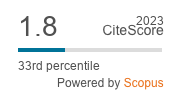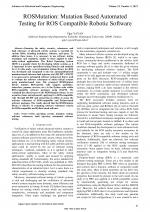| 3/2023 - 6 |
ROSMutation: Mutation Based Automated Testing for ROS Compatible Robotic SoftwareYAYAN, U. |
| View the paper record and citations in |
| Click to see author's profile in |
| Download PDF |
Author keywords
robot operating system, mutation testing, software robustness, fault injection, automated software testing
References keywords
software(16), testing(12), mutation(8), test(7), systems(6), robot(6), robotics(4), robotic(4), analysis(4)
Blue keywords are present in both the references section and the paper title.
About this article
Date of Publication: 2023-08-31
Volume 23, Issue 3, Year 2023, On page(s): 47 - 56
ISSN: 1582-7445, e-ISSN: 1844-7600
Digital Object Identifier: 10.4316/AECE.2023.03006
Web of Science Accession Number: 001062641900006
SCOPUS ID: 85172316027
Abstract
Ensuring the safety, security, robustness, and fault tolerance of advanced robotic systems is essential for various fields, including healthcare, industry, and space. To address these issues, it is necessary to use software testing techniques and standards, similar to those applied in other safety-critical applications. The Robot Operating System (ROS) is a popular choice for developing robotic systems, so it is important to have specialized testing libraries and methods for it. In this study, a novel mutation testing library for ROS was developed and integrated it into the automated/tailored mutation-based software fault injection tool (IM-FIT). IM-FIT is an open-source automated software testing tool that is used to evaluate the software robustness of safety-critical systems using mutation-based tests. The proposed ROSMutation library mutates ROS-specific code snippets (publisher, subscriber, params, services, etc.) in the Python code within ROS-compatible software packages using IM-FIT. We evaluated the effectiveness of the ROSMutation library in two scenarios (basic and advanced), applying it to ROS-compatible code through IM-FIT and measuring its ability to assess the software robustness of ROS-compatible and Python-based software packages. The results showed that the ROSMutation library is effective in evaluating software robustness criteria for ROS-compatible and Python based software. |
| References | | | Cited By |
Web of Science® Times Cited: 0
View record in Web of Science® [View]
View Related Records® [View]
Updated today
SCOPUS® Times Cited: 0
View record in SCOPUS® [Free preview]
There are no citing papers in the CrossRef Cited-by Linking system.
Disclaimer: All information displayed above was retrieved by using remote connections to respective databases. For the best user experience, we update all data by using background processes, and use caches in order to reduce the load on the servers we retrieve the information from. As we have no control on the availability of the database servers and sometimes the Internet connectivity may be affected, we do not guarantee the information is correct or complete. For the most accurate data, please always consult the database sites directly. Some external links require authentication or an institutional subscription.
Web of Science® is a registered trademark of Clarivate Analytics, Scopus® is a registered trademark of Elsevier B.V., other product names, company names, brand names, trademarks and logos are the property of their respective owners.
Faculty of Electrical Engineering and Computer Science
Stefan cel Mare University of Suceava, Romania
All rights reserved: Advances in Electrical and Computer Engineering is a registered trademark of the Stefan cel Mare University of Suceava. No part of this publication may be reproduced, stored in a retrieval system, photocopied, recorded or archived, without the written permission from the Editor. When authors submit their papers for publication, they agree that the copyright for their article be transferred to the Faculty of Electrical Engineering and Computer Science, Stefan cel Mare University of Suceava, Romania, if and only if the articles are accepted for publication. The copyright covers the exclusive rights to reproduce and distribute the article, including reprints and translations.
Permission for other use: The copyright owner's consent does not extend to copying for general distribution, for promotion, for creating new works, or for resale. Specific written permission must be obtained from the Editor for such copying. Direct linking to files hosted on this website is strictly prohibited.
Disclaimer: Whilst every effort is made by the publishers and editorial board to see that no inaccurate or misleading data, opinions or statements appear in this journal, they wish to make it clear that all information and opinions formulated in the articles, as well as linguistic accuracy, are the sole responsibility of the author.





